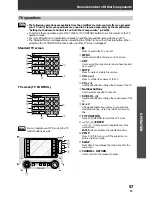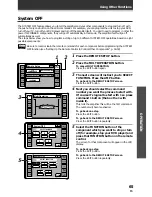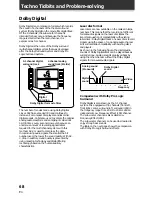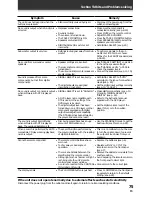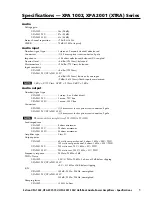
70
En
Techno Tidbits and Problem-solving
MPEG Audio
MPEG is an audio encoding system which delivers high quality audio for music and movies. By removing
frequencies which are out of the human hearing range, the sound is then compressed to enable the
transmission of mono, stereo, or multichannel (5.1 and 7.1) audio in a single bitstream which is why it has
become a standard audio format for DVD and personal computers. The composition and versatility of MPEG
audio also ensures that the presentation of a multichannel soundtrack will sound appropriate on everything from
a 7.1 channel surround sound home theater setup to a mono television set. Above all, MPEG audio is designed
to be compatible with past and future MPEG audio versions, which means that future versions of MPEG audio
will be compatible with decoders currently being produced (the signal is merely reconfigured to fit the number of
channels available in a system).
THX
THX is a Lucasfilm, Ltd. program dedicated to
maximum accuracy in movie presentation. Movie
sound tracks are recorded in large movie dubbing
stages using movie theater equipment. For a sound
track to be presented accurately in your home,
special technologies are required. In your home the
room is much smaller and has a bright sound, the
speakers are very different and there are only six of
them, plus, you sit much closer to each one of those
speakers. Because of these differences we often
miss the power and emotion that thrills us in a good
movie. Now Pioneer and THX have teamed up to
bring the full glory of accurate cinema sound to the
comfort and convenience of your home.
Re-Equalization™ :
In a theater the room is very
large and dead sounding, you sit a long way back
from the speakers and the speakers themselves are
very specialized. Because a sound track recorded in
this dead sounding space when it is played at home
it sounds overbright. THX Re-Equalization adjusts for
this difference in a very precise way.
Dynamic Decorrelation™ :
When a sound track
sends mono sound to the surround speakers it often
seems to be coming from one side instead of from
all around you as it would in a theater. Dynamic
Decorrelation helps to correct this inaccuracy.
Timbre Matching™ :
When recording a sound track
it is very important that the surround sounds move
smoothly and seamlessly around the theater. It is
very distracting when sounds seem to jump from
speaker to speaker. Timbre Matching helps to
smooth the movement of the surround sounds even
though you are using only two speakers.
Bass Peak Level Manager™ :
Some Dolby Digital
and DTS soundtracks can produce bass peaks that
are undesirable in a home theater environment. The
Bass Peak Level Manager allows you to set the
maximum peak levels appropriate to your system.
(Set this function according to the
BASS PEAK
LEVEL MANAGER
instructions on page 34.)
Loudspeaker Position Time Synchronization™ :
This feature allows you to adjust for the difference in
the distance from each individual loudspeaker to the
listening position. Doing this ensures that all the
speakers operate in precise synchronization
improving the seamless nature of the soundfield.
(Set this function according to the
CHANNEL DELAY
instructions on page 30.)


